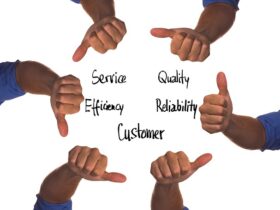Emotional Intelligence can be more than a buzzword within this fast-paced, high-stress workplace-a skill in today’s workplace that provides an edge to simply good leaders over the great ones. This is because leadership is not all about making decisions, guiding teams, or just understanding but also motivating people on a deeper level. Let’s dive into what emotional intelligence is, why it’s such a game-changer in leadership, and how it can shape the workplace and those working around it.
What is Emotional Intelligence?
Emotional intelligence, also referred to as EI or EQ, is defined as the ability to monitor one’s feelings and those of others, while distinguishing between the two. EI touts several key components that include but are not limited to:
Self-awareness: Recognizing one’s emotions and how those emotions impact.
Self-regulation: Governing your responses to events, circumstances, and people.
Motivation: The driving forces of the self with determination, even in the face of obstacles.
Empathy: Trying to conceptualize the way others feel and perceive.
Social skills: The relation of maintaining smooth relations, establishing rapport, and influencing people.
When leaders demonstrate these qualities, an atmosphere of trust and respect is built.
Why is Emotional Intelligence so crucial for Leaders?
Leadership is best described as guiding, influencing, and supporting people. As much as technical skills are admired, emotional intelligence allows leaders to connect with their teams on a personal basis. Here is why that connection is so important:
Trust and respect develop much more easily when the leader has their emotions under control and shows empathy towards other people. When I first started working as a manager, one of the important things that I picked up rather early on was: that if you treat other people with respect and value them, they do tend to respond better. Learning not to jump into mistakes and immediately critique them, but rather to approach them curiously and with concern, is huge.
Team Morale and Productivity Improvement: The motivating and empathizing ability of a leader toward the workers brings a positive work environment. When people are understood, they become motivated; thus, they give more effort than expected.
Decision-Making Improvement: EI enhances a leader’s ability for balanced decisions. With high emotional intelligence, leaders can take time to evaluate the emotions playing and make a more thoughtful decision based on that.
Core Competencies of Emotional Intelligence in Leadership
Now, let’s look closer at the specific EI competencies and how these apply to the leader. These are,
1. Self-Awareness: Knowing Your Strengths and Weaknesses
Self-awareness is all about honesty with oneself on points of strength, weaknesses, and things that trigger you. If you know what affects you emotionally, you can manage your reaction much better. For instance, I still remember getting tough feedback once. Rather than being on the defense, I took my time to think about how that made me feel. The use of a pause helped me construct a better response, which not only helped in my growth but also helped in improving relationships with my team.
2. Self-Regulation: Managing Your Emotions
Leaders are always pushed. Self-regulation means being serene amidst stress, not knee-jerk reactions. This is not only a good example but also an example that maintains the team in its place. For example, earlier in my previous position, I was leading a very urgent deadline when all hell started to break loose. Without being unduly critical, I took a deep breath, acknowledged the stress everyone was facing, and asked what support was needed from my team. That kept everyone focused instead of flustered.
3. Empathy: Understanding Others’ Emotions
Empathy is a great tool within leadership because it makes the connection real. It is trying to put yourself into somebody else’s shoes and understand where they’re at, but trying to respond thoughtfully. I remember working once with a team member whose personal issues understandably caused her a lot of headaches. By recognizing her situation and accommodating her flexibility, not only was I able to get her through that tough time, but also strengthened her bond of trust and commitment toward the team.
4. Motivation: Engaging and Driving Teams Forward
A motivated leader inspires his or her team, even in times of hardship. Motivation isn’t about pushing people but rather about understanding aspirations and helping to realize goals. For instance, I would reiterate to my team the greater purpose of our work helps them visualize a bigger picture behind what they are trying to accomplish. This motivation helped us overcome obstacles together.
5. Social Skills: Communication and Relationship-Building
Social skills include the proper understanding of effective communication and conflict management. A highly social-skilled leader can handle disputes tactfully and establish robust and cooperative relations. Once, I remember two members objected to a project direction. I brought harmony between them by just repeating both sides without judgment and helped them meet on common ground; conflicts were resolved, and better collaboration on future projects was achieved.
How to Develop Emotional Intelligence as a Leader
Emotional intelligence does not come with an overnight flight. It is an evolutionary process and requires continuous effort and introspection. Here come the practical steps: Do some reflection in which one takes, say, a few minutes each day to review his reactions and emotions, or even jot down the details in a journal.
Seek Feedback: Ask your team and peers for candid feedback about your communication and emotional responses. That may provide insights that you might fail to notice.
Observe and Listen: Observe the emotional hints of others and listen actively. This will help increase your empathy and comprehension.
Stay Calm Under Pressure: Engage yourself with deep breathing or any other mindfulness activities to stay cool. The calmer you are, the better decisions you will be able to make.
Pursue Professional Development: Consider courses in emotional intelligence, leadership, or conflict resolution. These tools will give further structure to your development.
The Impact of Emotionally Intelligent Leaders on Organizations
Emotionally intelligent leaders not only create a better work culture, but they also have the power to lift an organization’s overall success. Here are some key impacts an emotionally intelligent leader has on organizations across the board:
Reduced Turnover: Employees are much more likely to be around for the long haul when they feel understood and valued.
More Engaged: Motivated and purposeful people are more engaged in their work.
More Collaboration: Teams reporting to emotionally intelligent leaders tend to communicate and collaborate more.
More Resilient to Change: Emotionally intelligent leaders are adaptable. Thus, it makes the task of change and challenge easy for the organization to handle.
In conclusion, it is more than a buzzword; rather, it is a transformational skill through which a leader can mold the culture, success, and future of any organization. The leaders understand and apply EI for better effectiveness, and develop a supportive team that is motivated and can perform well.
Whether you are a current or future leader, remember this: Each step you take toward greater emotional intelligence pays off in your life and the lives of those around you. It is a skill worth cultivating, and the results are well worth the effort.

































I really prize your work, Great post.
You could definitely see your skills in the work you write. The arena hopes for even more passionate writers such as you who are not afraid to say how they believe. Always follow your heart.